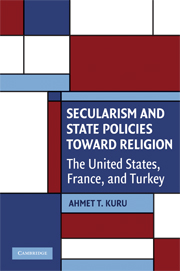Book contents
- Frontmatter
- Contents
- List of Figures and Tables
- Glossary of Abbreviations
- Acknowledgments
- Secularism and State Policies toward Religion
- Introduction
- 1 Analyzing Secularism
- PART I THE UNITED STATES
- PART II FRANCE
- PART III TURKEY
- 6 Assertive Secularism and the Islamic Challenge (1997–2008)
- 7 Westernization and the Emergence of Assertive Secularism (1826–1997)
- Conclusion
- Appendix A State-Religion Regimes Index of 197 Countries
- Appendix B Human Development and Official Religion in 176 Countries
- Appendix C State-Religion Regimes in Forty-Six Muslim Countries
- Appendix D Turkey's National Security Council Decisions, February 28, 1997
- Bibliography
- Index
6 - Assertive Secularism and the Islamic Challenge (1997–2008)
Published online by Cambridge University Press: 05 June 2012
- Frontmatter
- Contents
- List of Figures and Tables
- Glossary of Abbreviations
- Acknowledgments
- Secularism and State Policies toward Religion
- Introduction
- 1 Analyzing Secularism
- PART I THE UNITED STATES
- PART II FRANCE
- PART III TURKEY
- 6 Assertive Secularism and the Islamic Challenge (1997–2008)
- 7 Westernization and the Emergence of Assertive Secularism (1826–1997)
- Conclusion
- Appendix A State-Religion Regimes Index of 197 Countries
- Appendix B Human Development and Official Religion in 176 Countries
- Appendix C State-Religion Regimes in Forty-Six Muslim Countries
- Appendix D Turkey's National Security Council Decisions, February 28, 1997
- Bibliography
- Index
Summary
On February 28, 1997, Turkey's National Security Council (MGK), consisting of President Süleyman Demirel, Prime Minister Necmettin Erbakan, three ministers, and six generals, had its monthly meeting. This particular summit resulted in a “soft” coup d'état against the premiership of Erbakan. The generals had already changed the security doctrine of the military by defining irtica (reactionism) as a primary national security threat similar to the Kurdish terrorist group Kurdistan Workers' Party (PKK). The generals succeeded in imposing this new doctrine on the civilian members of the MGK, in addition to forcing them to sign a program to fight irtica, which implicitly or explicitly included (1) the purge of bureaucrats suspected to be affiliated with Islamism and (2) the closure of the Qur'an courses and Imam-Hatip (Islamic) schools that taught students who did not finish the eighth grade. The MGK's press declaration explains the rationale of the meeting by emphasizing that “secularism in Turkey is not only the assurance of political regime, but also … a way of life.”
Following the MGK meeting, the generals continued to challenge the coalition government comprising Erbakan's Refah (Welfare) Party (RP) and Tansu Çiller's Doğru Yol (True Path) Party (DYP). The generals organized several briefings for the media and judiciary in order to explain the “reactionary threat to Turkey” and to emphasize that they were willing and ready to use military force against such a threat. The government resigned after a couple of months. The generals were not alone in initiating the “February 28 process.”
- Type
- Chapter
- Information
- Secularism and State Policies toward ReligionThe United States, France, and Turkey, pp. 161 - 201Publisher: Cambridge University PressPrint publication year: 2009



